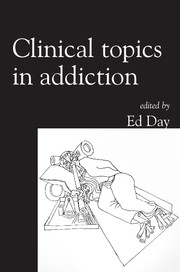Book contents
- Frontmatter
- Contents
- List of tables
- List of boxes
- List of figures
- List of contributors
- Foreword by Nat Wright
- Preface
- 1 What works in drug addiction?
- 2 The development of the drug treatment system in England
- 3 Stimulant use still going strong
- 4 Adverse effects of khat: a review
- 5 What the clinician needs to know about magic mushrooms
- 6 What works in alcohol use disorders?
- 7 Management of alcohol detoxification
- 8 Nicotine addiction and smoking cessation treatments
- 9 Pathological gambling: an overview of assessment and treatment
- 10 Use of investigations in the diagnosis and management of alcohol use disorders
- 11 Laboratory investigations for assessment and management of drug problems
- 12 Pharmacotherapy in dual diagnosis
- 13 Dual diagnosis: management within a psychosocial context
- 14 Treating depression complicated by substance misuse
- 15 Treating anxiety complicated by substance misuse
- 16 An overview of psychological interventions for addictive behaviours
- 17 Motivational interviewing
- 18 Substance misuse in adolescents
- 19 Management of drug misuse in pregnancy
- 20 Intoxication and legal defences
- 21 Substance misuse and violence: the scope and limitations of forensic psychiatry's role
- 22 Literary and biographical perspectives on substance use
- Index
21 - Substance misuse and violence: the scope and limitations of forensic psychiatry's role
Published online by Cambridge University Press: 02 January 2018
- Frontmatter
- Contents
- List of tables
- List of boxes
- List of figures
- List of contributors
- Foreword by Nat Wright
- Preface
- 1 What works in drug addiction?
- 2 The development of the drug treatment system in England
- 3 Stimulant use still going strong
- 4 Adverse effects of khat: a review
- 5 What the clinician needs to know about magic mushrooms
- 6 What works in alcohol use disorders?
- 7 Management of alcohol detoxification
- 8 Nicotine addiction and smoking cessation treatments
- 9 Pathological gambling: an overview of assessment and treatment
- 10 Use of investigations in the diagnosis and management of alcohol use disorders
- 11 Laboratory investigations for assessment and management of drug problems
- 12 Pharmacotherapy in dual diagnosis
- 13 Dual diagnosis: management within a psychosocial context
- 14 Treating depression complicated by substance misuse
- 15 Treating anxiety complicated by substance misuse
- 16 An overview of psychological interventions for addictive behaviours
- 17 Motivational interviewing
- 18 Substance misuse in adolescents
- 19 Management of drug misuse in pregnancy
- 20 Intoxication and legal defences
- 21 Substance misuse and violence: the scope and limitations of forensic psychiatry's role
- 22 Literary and biographical perspectives on substance use
- Index
Summary
Summary Psychiatric disorder, substance misuse and violence often coexist in the work of a forensic psychiatrist, and forensic psychiatry should view the management of substance misuse problems as fundamental to practice. The causes are part of an interactional process involving the basic pharmacological effects of alcohol and drugs, the substance use context, environment, culture and personality factors such as predisposition to aggression. The prevalence of alcohol and drug use in prisoners is high, with 66% of prisoners reporting drug use in the month before being received into prison, and 39% whilst in prison. This is significant as individuals with comorbid mental health and substance misuse are more likely than those with only psychosis to report offending or aggression. The forensic psychiatrist may have a number of opportunities to identify offenders who misuse substances, and should be aware of the available treatment pathways and strategies.
For the past 30 years, forensic psychiatry has been concerned with violent offenders with psychosis and/or personality disorder. If dual diagnosis or comorbidity meant anything to a forensic psychiatrist, it would be the ‘typical’ forensic case – an individual with schizophrenia and a premorbid dissocial personality who had been arrested for a violent crime. In this chapter I use comorbidity to describe the co-occurrence of two or more conditions (here a psychiatric disorder and health problems arising from substance misuse) rather than dual diagnosis. In fact, many violent offenders have multiple diagnoses. Williams & Cohen (2000) argue that dual diagnosis suggests a closer relationship, perhaps including cause and effect, and is a subset of comorbidity.
Forensic psychiatrists have probably kept up with developments in criminal law as it relates to crimes associated with alcohol and drugs more than they have with the psychiatry of substance (alcohol and drug) misuse and its relationship to forensic psychiatry. Speciality training arguably encourages this narrow focus. This is unfortunate, as the Epidemiologic Catchment Area (ECA) surveys (Regier et al, 1990) have shown that having a mental disorder doubles the risk of an alcohol misuse disorder and quadruples the risk of a drug-related disorder. The institutional ECA survey of psychiatric patients and prisoners shows even higher levels of comorbidity, with a lifetime prevalence of substance use disorders of 16.7% in the general population and 39% in patients of mental hospitals.
- Type
- Chapter
- Information
- Clinical Topics in Addiction , pp. 288 - 302Publisher: Royal College of PsychiatristsPrint publication year: 2007



